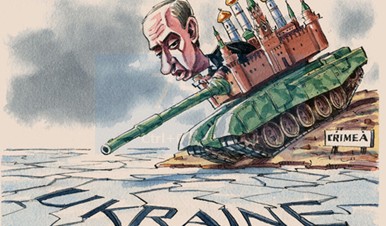
As US President Barack Obama and the leaders of the EU huddle together this week, they will strive to look united and resolved. The reality, as Vladimir Putin knows, is that they are divided and uncertain. The Russian president has moved with a speed and ruthlessness that has left western leaders floundering. Russia swallowed Crimea, in less than a week, with scarcely a shot fired. It has now massed troops on Ukraine’s eastern border – and all that the west has so far offered the Ukrainian military is a supply of US army ready-meals.
在美國(guó)總統(tǒng)巴拉克•奧巴馬(Barack Obama)與歐盟(EU)領(lǐng)導(dǎo)人本周會(huì)晤之際,他們將力求顯得團(tuán)結(jié)而果斷。但正如俄羅斯總統(tǒng)弗拉基米爾•普京(Vladimir Putin)所知道的,現(xiàn)實(shí)是他們之間有分歧,而且不確定該怎么做。普京迅速而無(wú)情的行動(dòng)讓西方各國(guó)領(lǐng)導(dǎo)人顯得狼狽。俄羅斯幾乎沒(méi)費(fèi)一槍一彈,就在不到一周時(shí)間里吞并了克里米亞。眼下,俄羅斯在烏克蘭東部邊境集結(jié)重兵,而西方迄今向?yàn)蹩颂m軍方提供的只是美軍的快餐口糧。
But the notion that Mr Putin has notched up a brilliant victory is misleading. In reality, he has gambled dangerously – and he is likely to lose his bet on the use of force. The annexation of Crimea is risky enough. But an invasion of eastern Ukraine would spell disaster for Russia.
但是,有關(guān)普京已經(jīng)取得輝煌勝利的看法是錯(cuò)誤的。現(xiàn)實(shí)是,他在進(jìn)行危險(xiǎn)的賭博,而且他付諸武力的豪賭很可能失手。吞并克里米亞的風(fēng)險(xiǎn)已經(jīng)夠大的了,但入侵烏克蘭東部將為俄羅斯帶來(lái)災(zāi)難。
Mr Putin’s decision to grab Crimea was a desperate response to a Ukrainian revolution that the Kremlin could neither stop nor control. Rather than go down in history as a weakling who was watching ice dancing in Sochi as Russia “l(fā)ost” Ukraine, Mr Putin decided to move on Crimea. It worked. Within days, he was enjoying standing ovations in Moscow and soaring opinion poll ratings.
普京決定吞并克里米亞是對(duì)烏克蘭革命的絕望回應(yīng)——克里姆林宮既無(wú)法阻止也無(wú)法控制這場(chǎng)革命。在俄羅斯“失去”烏克蘭之際,普京選擇出兵克里米亞,而不是作為一名在索契觀看冰上舞蹈的弱者被載入史冊(cè)。這種策略奏效了。在幾天時(shí)間里,普京在莫斯科享受著議員們的起立鼓掌,同時(shí)民調(diào)支持率飆升。
But by grabbing Crimea, Russia has ensured that it will eventually lose Ukraine. If Ukraine is allowed to proceed with elections in May, an anti-Moscow majority is all but assured since the Russian speakers of Crimea will no longer be voting, and the remaining electorate is likely to be radicalised by the Russian threat. The interim Ukrainian government has just signed an accord with the EU – the very development that Russia was striving to prevent in the first place. Despite the carefully engineered display of pro-Russian euphoria in Crimea, the territory’s disgruntled minorities – particularly the Tatars – may well resist incorporation into Russia.
但是吞并了克里米亞,俄羅斯最終將失去烏克蘭就成了一件板上釘釘?shù)氖隆H绻衲?月烏克蘭能夠如期舉行選舉,反對(duì)莫斯科的選民肯定會(huì)占多數(shù),因?yàn)榭死锩讈喼v俄語(yǔ)的選民不再參加選舉,剩下的選民很可能在俄羅斯的威脅之下變得激進(jìn)。烏克蘭臨時(shí)政府剛剛與歐盟簽署協(xié)定——這正是俄羅斯起初竭力阻止的。盡管俄羅斯在克里米亞精心營(yíng)造出民眾歡欣鼓舞的親俄場(chǎng)景,但該地區(qū)心懷不滿(mǎn)的少數(shù)民族(尤其是韃靼人)很可能抵制并入俄羅斯。
A military move into eastern Ukraine would greatly increase the dangers of a political, military and economic blowback sufficiently powerful to threaten the leadership in the Kremlin. Western military analysts have no doubt that, in the first instance, the Russian army would swiftly overwhelm Ukrainian forces. But recent history suggests that, when the world’s leading powers resort to military intervention against a hostile local population, they almost always suffer a long-term strategic defeat. The swift conventional military victory feels great at the time – but is followed by long-term agony.
俄羅斯出兵烏克蘭東部將會(huì)大幅增加政治、軍事和經(jīng)濟(jì)上反彈的風(fēng)險(xiǎn),這種反彈將足以對(duì)克里姆林宮的領(lǐng)導(dǎo)層構(gòu)成威脅。西方軍事分析家確信,一開(kāi)始俄羅斯軍隊(duì)將會(huì)迅速擊潰烏克蘭軍隊(duì)。但近年歷史表明,當(dāng)世界強(qiáng)國(guó)武力干涉一個(gè)當(dāng)?shù)厝藢?duì)其懷有敵意的國(guó)家時(shí),他們幾乎總是會(huì)遭遇長(zhǎng)期戰(zhàn)略失敗。迅速取得常規(guī)軍事勝利當(dāng)時(shí)會(huì)帶來(lái)成就感,但接下來(lái)會(huì)是長(zhǎng)期的痛苦。
Mr Putin, who has lamented that the collapse of the Soviet Union was the greatest “geopolitical disaster of the 20th century”, should know that “disaster” was greatly accelerated by the draining effects of the Soviet war in Afghanistan. Even the mighty US – with the largest economy and the most advanced military machine in the world – was unable to win in either Iraq or Afghanistan.
普京哀嘆稱(chēng),蘇聯(lián)解體是“20世紀(jì)最大的地緣政治災(zāi)難”。他理應(yīng)明白,阿富汗戰(zhàn)爭(zhēng)讓蘇聯(lián)消耗了國(guó)力,大大加快了這場(chǎng)“災(zāi)難”的到來(lái)。即便是強(qiáng)大的美國(guó)——美國(guó)是世界上第一大經(jīng)濟(jì)體,而且擁有最先進(jìn)的戰(zhàn)爭(zhēng)機(jī)器——也未能贏得伊拉克或者阿富汗戰(zhàn)爭(zhēng)。
The cautious, professorial leader in the White House has apparently learnt the lessons of these failed wars far better than his swaggering bare-chested rival in the Kremlin. Of course, the Russian (and American) public get a certain retro thrill from a macho leader who is willing to send in the tanks. But, in time, they end up lamenting his folly.
與克里姆林宮趾高氣昂、裸露上身的領(lǐng)導(dǎo)人相比,白宮謹(jǐn)慎而專(zhuān)業(yè)的領(lǐng)導(dǎo)人顯然更好地從這些輸?shù)舻膽?zhàn)爭(zhēng)中汲取了教訓(xùn)。當(dāng)然,普京愿意派遣坦克上陣,會(huì)讓俄羅斯(乃至美國(guó))公眾產(chǎn)生某種懷舊的激動(dòng),但總有一天,他們將會(huì)哀嘆他的愚蠢。
Why is it that military force has become so much less effective in achieving political goals? Jeremy Shapiro of the Brookings Institution, who until recently worked for the policy-planning staff at the US state department, suggests that changes in military and social technology have made it much harder for invading armies to secure a lasting victory.
為何軍事力量在達(dá)到政治目的方面變得如此不濟(jì)?布魯金斯學(xué)會(huì)(Brookings Institution)的杰里米•夏皮羅(Jeremy Shapiro)提出,軍事和社交科技的改變加大了入侵軍隊(duì)獲得持久勝利的難度。夏皮羅直到不久前還在為美國(guó)國(guó)務(wù)院的政策規(guī)劃班子工作。
Unless the population of the area that has been invaded is tiny – or almost entirely welcoming – an insurgency is likely to develop. Modern-day insurgents usually have weaponry, such as roadside bombs or rocket-propelled grenades, that can inflict steady casualties on an occupying army.
除非被入侵地區(qū)的人口很少(或者幾乎全部人口歡迎入侵),否則該地區(qū)很可能發(fā)生叛亂。當(dāng)今時(shí)代的叛亂分子通常有路邊炸彈或者火箭推進(jìn)榴彈等武器,可以讓入侵軍隊(duì)不斷遭受傷亡。
They now also have social media and mobile communications technology that make it much easier to get organised. If the insurgency also has powerful external supporters – as in Afghanistan, Syria and Iraq – it can be almost impossible to subdue.
他們現(xiàn)在還有社交媒體和移動(dòng)通信技術(shù),這讓他們更容易組織起來(lái)。如果他們還獲得了強(qiáng)大的外部支持(就像在阿富汗、敘利亞和伊拉克發(fā)生的情況),叛亂幾乎不可能平息。
The Russians have one “advantage” that they could deploy in trying to suppress an insurgency in Ukraine: the willingness to act with extreme brutality that was displayed during the Chechen wars. But the population of Chechnya is only a little more than 1m and the territory lies within the borders of the Russian state. Deploying “Grozny tactics” after an invasion of a sovereign nation of 45m people, on the borders of the EU, would be an entirely different matter.
俄羅斯有一個(gè)鎮(zhèn)壓烏克蘭叛亂的“優(yōu)勢(shì)”:就像車(chē)臣戰(zhàn)爭(zhēng)期間展示出的那樣,俄方愿意采取極端野蠻的手段。但車(chē)臣人口只是略多于100萬(wàn),而且該地區(qū)處于俄羅斯境內(nèi)。在入侵一個(gè)與歐盟接壤、擁有4500萬(wàn)人口的主權(quán)國(guó)家之后采用“格羅茲尼戰(zhàn)術(shù)”,將完全是另一回事。
For that reason, Mr Putin may prefer – for now – to use his military to nibble away at smaller targets, such as Moldova. His tactics in Ukraine could initially be restricted to economic pressure, using the leverage of Russian energy, as well as political destabilisation and bribery. Yet trying to turn its large, western neighbour into a basket case is also not a great long-term option for Russia. Even if Mr Putin is not yet set on an invasion of eastern Ukraine, economic and political warfare could unleash a series of events that would eventually lead to armed conflict.
出于上述原因,普京眼下可能傾向于用武力蠶食摩爾多瓦等較小的目標(biāo)。他在烏克蘭的戰(zhàn)術(shù)最初可能局限于經(jīng)濟(jì)壓力,利用俄羅斯能源、破壞政治穩(wěn)定和賄賂等手段。然而讓本國(guó)西面的龐大鄰國(guó)陷入一團(tuán)糟,對(duì)俄羅斯并非長(zhǎng)期上策。即便普京目前尚未決定入侵烏克蘭東部,但雙方在經(jīng)濟(jì)和政治上的角力可能引發(fā)一系列事件,最終導(dǎo)致武裝沖突。
If Russian troops do go into Ukraine, you can expect initial triumphalism in Moscow – and hand-wringing in the west. But a “show of strength” in Ukraine would ultimately gravely weaken the Russian state.
如果俄羅斯軍隊(duì)真的進(jìn)入烏克蘭,可以預(yù)料的是一開(kāi)始莫斯科將陶醉在勝利的喜悅中,而西方則會(huì)苦惱不已。但在烏克蘭“展示實(shí)力”最終將嚴(yán)重削弱俄羅斯。












